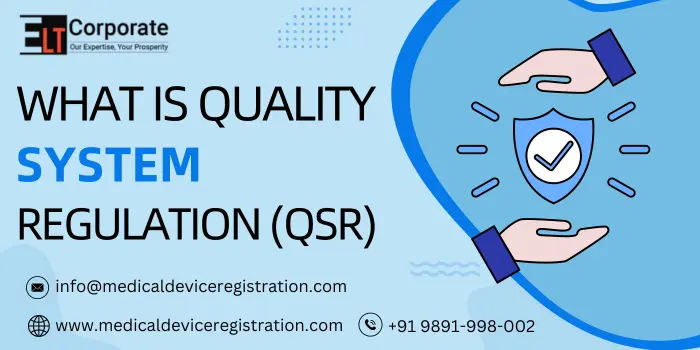In the highly regulated industry of medical devices and pharmaceuticals, ensuring quality, safety and compliance is of the utmost importance. The Quality System Regulation (QSR) serves as a comprehensive guide designed to uphold these standards, particularly in the manufacturing of medical devices and pharmaceutical products.
QSR mandates strict quality control measures to ensure that products are safe, effective and reliable for consumer use enforced by regulatory bodies like the U.S. Food and Drug Administration (FDA).
This guide will help you to understand an in-depth overview of QSR, its importance, regulatory requirements, and its impact on the medical device and pharmaceutical industries. Understanding these regulations is essential for manufacturers to maintain compliance, avoid legal penalties, and deliver high-quality products that meet global safety standards.
What is Quality System Regulation?
Quality system regulation is a set of rules and guidelines that guarantee items and services and fulfil certain guidelines of safety, quality, and viability. These regulations are set up by the government or administrative bodies to protect purchasers and guarantee that items are safe to use and perform as planned.
Key Components Of Quality System Regulation
Mentions are the key components of Quality System Regulations:
- Standards and Guidelines: Quality regulations set clear norms that items or services should meet. These standards cover different perspectives, such as reliability, performance, and reliability.
- Inspections and Testing: To ensure the standards are met, products undergo inspection and testing. This can incorporate checking the materials utilized, the manufacturing process, and the final product.
- Certification and Compliance: When a product passes the required tests, it gets certified. This certificate shows that the product fulfils the regulatory standards. Organizations should conform to these guidelines to sell their items.
- Ongoing Monitoring: Even after a product is on the market, regulators may continue to monitor it to ensure it stays safe and effective. This can include occasional inspections and reviewing customer feedback.
What is the QMS System in Pharma?
A Pharmaceutical Quality Management System (QMS) is a set of procedures, policies, and processes that ensure pharmaceutical products are reliably excellent or of high quality. It covers all stages of medication manufacturing, including Method development, Facilities, Utility systems, and Equipment.
It encompasses:
- Method Development – Ensure reliable processes for drug formulation and testing.
- Facilities and infrastructure – Maintaining GMP-compliant products environment.
- Utility System – This should manage the resources that are used for manufacturing such as water, air and energy.
- Equipment – Make sure that all machines and instruments comply with calibration and validation standards.
A strong QMS System helps pharmaceutical companies minimize risks, enhance compliance, and ensure patient safety by delivering consistent, high-quality medication.
What is FDA Quality System Regulation?
The FDA Quality System Regulation (QSR) guarantees medical devices sold in the U.S. are safe and work appropriately. It requires companies to carefully design, create, and check whether their devices are genuine and handle any complaints to protect the public.
Under QSR, the manufacturer must:
- Implement strict quality control measures throughout the product lifecycle.
- For the design, testing and validation follow the documentation procedure.
- Always conduct post-market surveillance to address any product defects or customer complaints.
What is 21 CFR 820 Quality System Regulation?
21 CFR 820, is also known as Quality Framework Regulation, is a part of U.S. law that sets principles for the design, production, and delivery of medical devices. It guarantees these devices are safe and effective before they are sold. regulation covers everything from the initial design to the final delivery of a medical device, including testing, fabricating, naming, and handling protests. It protects patients by guaranteeing that medical devices meet high quality and safety standards.
21 CFR 820 Cover:
Design & Development – Ensuring all devices are designed to meet safety standards.
✔ Production & Manufacturing – Establishing robust production protocols to maintain product integrity.
✔ Testing & Validation – Conducting performance and safety evaluations.
✔ Labeling & Packaging – Ensuring proper labelling with necessary usage instructions and warnings.
✔ Complaint Handling & CAPA – Implementing a system to address complaints and corrective actions.
This regulation plays a critical role in ensuring that all medical devices meet the highest quality and safety standards before they enter the market.
Do QSR Regulations Apply to All Medical Devices?
Yes, FDA Quality System Regulations (QSRs) apply to all devices intended for human use to guarantee they are safe and effective. This includes everything from basic tools like tongue depressors to complex machinery like heart pacemakers. These regulations help ensure that any device utilized for medical purposes fulfils severe safety guidelines.
How Does The QSR Impact the Design and Development of Medical Devices?
The QSR requires manufacturers to implement design controls, ensuring that devices are designed to meet user needs and intended uses. This includes design planning, input and output verification, validation, and design reviews.
Conclusion
In conclusion, the Quality System Regulation (QSR) ensures that pharmaceutical manufacturers adhere to strict rules to create products that are safe and effective for consumer use. These strict rules included everything from product design to manufacturing of the Medical Device quality. The FDA’s QSR and other regulations like 21 CFR 820 play an important role in checking whether the pharmaceutical devices are meeting the standards before they are sold in the markets.
What is the QSR Quality System?
The QSR quality system ensures that medical devices sold in the USA are effective and safe for consumers.
Why is QSR System Regulation Important?
The QSR system regulation is important because it coordinates and guides the company in addressing market demands and enacted laws.
What is the QSR Full Form?
The full form of the QSR is Quality System Regulation.
What is an FDA QSR Definition?
The FDA QSR is the quality system regulation and it is defined in 21 CFR part 820 states, that producers should follow a quality system to help in making sure that companies are producing products that meets standards and requirements.

